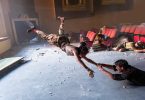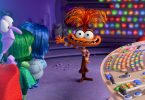I don’t think anyone loves movies more than Quentin Tarantino. Just watch any of his films or listen to any of his interviews and within minutes you can see and hear his passion and knowledge about the industry. Once Upon A Time In… Hollywood is his supposed penultimate film according to himself and features the typical flare and style you would expect out of a Tarantino film, although it’s much more character driven than violence driven than his previous films. Like most of his work, it’s a love letter to film itself and has many brilliant scenes that showcase the best of Hollywood. But at over two and a half hours in length, the film can also get bogged down with its own story and drag on for way longer than necessary.
Actor Rick Dalton (Leonardo DiCaprio) has made a successful career in Hollywood as the lead in the television series Bounty Law, but after failing to make the transition from TV to film and only appearing in a handful of guest roles on other shows, he’s beginning to wonder if he all washed up. By his side is his stunt double and friend Cliff Booth (Brad Pitt), whose job has become chauffeur and handyman since the acting jobs are few and far between. As Dalton’s career falters, the young and beautiful Sharon Tate (Margot Robbie) sees her career on the rise.
Right off the bat, Tarantino does a fantastic job at capturing the aesthetic of 1960’s Hollywood. The look and feel of every scene wonderfully captures the era, right down to the fine details in the cars, the shops, and the products. Even the aspect ratio of the film will change accordingly, like how clips of Bounty Law play at a 4:3 aspect and in black and white. It helps tie everything together and keep track of where you are in the story, as we all know that Tarantino rarely likes to tell things in a linear fashion.
Another thing about the film is that it is considerably less violent than his previous films. The main focus of the film is on Rick Dalton and his struggling career. Leonardo DiCaprio is perfect in the role and delivers what could be the best performance of his career. All of the film set scenes are especially wonderful, and DiCaprio is able to brilliantly convey the mindset of an actor who might not have much left. There’s a scene between him and an 8-year-old “method actor,” portrayed by Julia Butters, that is both hilarious and sad. It’s funny because of how absurd some of the dialogue it, and yet so much of it is absolutely true of Hollywood too, even by today’s standards.
Once Upon A Time In… Hollywood gets a little less interesting when the story strays too far away from Dalton, however. Cliff Booth can be just as entertaining at times, as evident by his fight scene with Bruce Lee (Mike Moh), but there are plenty of moments that feel like unnecessary filler. I don’t need to see how he fixes an antenna on the roof or the half dozen times he pulls into the driveway in the exact same manner. The same can be said about Sharon Tate as well. As much as I enjoyed Margot Robbie’s portrayal of her, so many of her scenes felt like they were there to just draw out the film. It can all be a little exhausting to watch, even for the biggest of Tarantino fans.
Personally, Once Upon A Time In… Hollywood lands right in the middle tier of Quentin Tarantino films for me. It’s not his best film overall, although it does feature some of his best work. Everyone’s performances are great and they all steal a scene or two. The film can just get carried away with itself at times and become a little long winded. It’s extremely on the nose, both in its depiction of 60’s Hollywood and in speaking directly to the audience at times. It’s pure Tarantino.
-
Once Upon a Time in Hollywood
Summary
I don’t think anyone loves movies more than Quentin Tarantino. Just watch any of his films or listen to any of his interviews and within minutes you can see and hear his passion and knowledge about the industry. Once Upon A Time In… Hollywood is his supposed penultimate film according to himself and features the typical flare and style you would expect out of a Tarantino film, although it’s much more character driven than violence driven than his previous films. Like most of his work, it’s a love letter to film itself and has many brilliant scenes that showcase the best of Hollywood. But at over two and a half hours in length, the film can also get bogged down with its own story and drag on for way longer than necessary.







